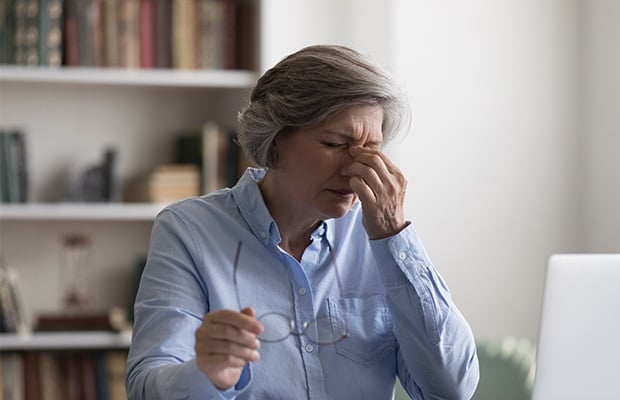If you live with a heart or circulatory condition, feeling extremely tired can be a part of everyday life.
This long-term tiredness is also called fatigue and can be caused by:
- your heart condition
- the medicines you’re taking
- other non-heart related conditions.
How do heart conditions cause tiredness?
Heart conditions are one of the most overlooked causes of persistent tiredness.
It happens because your heart is not pumping blood efficiently around your body so your muscles and organs do not get the oxygen they need to work properly – leaving you feeling drained, even after a full night’s sleep.
Conditions like heart failure, problems with your heart muscle (cardiomyopathies) and irregular heart rhythms (arrhythmias) can all cause fatigue.
For example, in heart failure, the heart becomes too weak or stiff to pump blood properly, leading to symptoms like breathlessness and feeling tired most of the time.
Which medicines can make you feel tired?
There are many medicines used to treat heart conditions that cause tiredness as a side effect. These include:
- Beta blockers such as bisoprolol and atenolol: these slow the heart rate and reduce blood pressure, which can sometimes lead to tiredness, especially when first starting treatment.
- Diuretics (water tablets): these help reduce fluid build-up but can cause dehydration or low blood pressure, both of which may make you feel weak or dizzy and lethargic or tired.
Other medicines for non-heart related conditions can also cause tiredness too, such as sleeping tablets and anxiety medications. These can cause daytime drowsiness or grogginess, especially if taken long-term.
If you're on any of these medicines and are feeling more tired than usual, ask your GP or pharmacist to review your prescriptions. Sometimes a lower dose or a different medicine can help reduce side effects while still being effective.
Can emotional issues cause tiredness?
Tiredness is not always because of a physical issue. Stress, anxiety and low mood can all contribute to tiredness too. Feeling tired can also make it harder to cope emotionally, creating a loop that’s hard to break.
This is especially true for people living with long-term conditions like heart and circulatory diseases, where fatigue can affect work, relationships and your self-esteem.
Pacing yourself, taking regular breaks, and finding small ways to rest and recharge can make a big difference. Our fatigue diary is a helpful tool for tracking energy levels and spotting patterns over time.
- Download the fatigue diary so you can fill it in yourself.
What other health conditions cause tiredness?
Not all tiredness is heart related. Other common causes include:
- Thyroid problems: An underactive thyroid (hypothyroidism) can slow down your metabolism and leave you feeling sluggish.
- Iron deficiency anaemia: This is one of the most frequent causes of excessive tiredness. It happens when the body does not have enough iron to make healthy red blood cells, which carry oxygen around the body. Symptoms include tiredness, shortness of breath and pale skin.
- Diabetes: If you have diabetes then your blood sugar levels may at times be too high or too low, both of which can cause fatigue.
- Vitamin D deficiency: Having low levels of vitamin D in your body is common in the UK, affecting 1 in 5 adults. It is especially problematic in the winter when there is little sunlight which is needed for the body to make vitamin D. The symptoms are vague but can include tiredness and low energy.
If you’re feeling unusually tired it’s important to see your healthcare team so they can find out the cause, especially if your tiredness is new, persistent or unexplained.
Simple blood tests can be used to see if you to have anaemia, check your thyroid function and vitamin D levels, and determine if you have diabetes.
What should I do if I’m always tired?
If you’re feeling tired all the time:
- Speak to your GP, especially if the tiredness is affecting your daily life or comes with other symptoms.
- Ask your GP or pharmacist to review your medications.
- Ask your GP for blood tests to rule out common causes like anaemia, thyroid problems and vitamin D deficiency.
- Keep a fatigue diary to track patterns and triggers.
To help ease persistent tiredness stay well hydrated and eat a healthy balanced diet, which will help boost your energy levels.
Taking part in physical activity as part of your daily routine can also help combat tiredness, especially if you do it outdoors so you can benefit from sunlight too.
What to read next...








